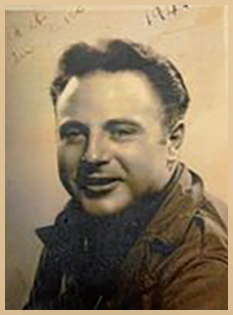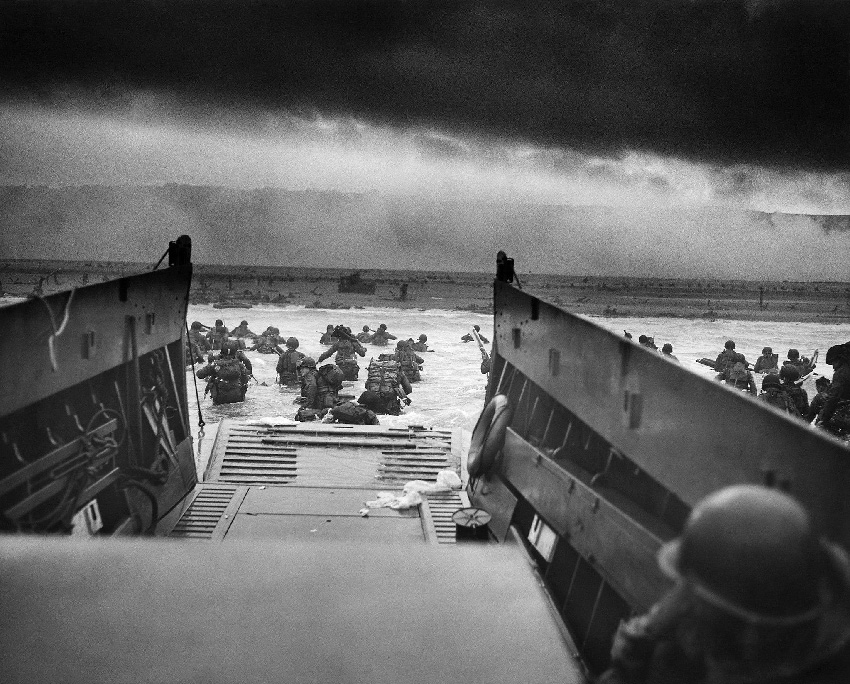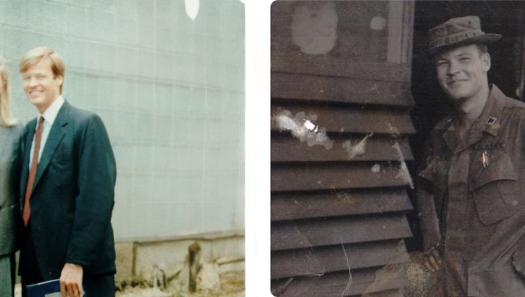Military & Veterans Life
Cover Story: Sgt. Frank Charrow lost and found

A Tribute to the 75th Anniversary of D-Day
By Brig. Gen. (Ret) Raymond E. Bell, Jr. PhD, U.S. Army
Editor’s Note: General Bell is the former Commanding General 220th Military Police Brigade (Army Reserve), USMA Graduate Class 1957, Graduate of Army and National War Colleges and is the author of more than 300 military, domestic and foreign publications. He is also the most published free-lance writer in the 20th Century to the oldest military journal in the world still being published, the Austrian OeMZ. In this Cover Story, he gives a little-known historical perspective of D-Day, the Allied Forces attack on Normandy Beach nearly 75 years ago.
If you were not in a U.S. Navy or Coastguard landing craft off the east coast of Normandy, France in the early morning hours of 6 June 1944, you probably cannot imagine the horror that confronted Sergeant Frank Charrow on that fateful day. Charrow was a military policeman assigned to the 214th Military Police (MP) Company of the 6th Engineer Special Brigade (ESB), the sole Army military company to land on Omaha Beach in the invasion of France to liberate the western European continent. He was also the only member of his unit to be listed missing in action.
Charrow’s Company were to be in craft destined to land after the first attack waves reached the beach named after the city of Omaha, Nebraska. It was a critical time because the landings were not going as planned. It was a state of utter chaos. Charrow approached the shore under intense fire by German machine gun and cannon fire. The enemy was well entrenched, many in reinforced concrete positions. From their positions the Germans could bring effective deadly flanking fire on those attempting to gain a foothold on the beach.
Engineers made up the initial wave to blast gaps through the German obstacles. Not only did they have to negotiate Rommel’s defense measures of steel beams welded together to form pronged structures and “Belgian Gates” to stop the landing craft, they had to contend with self-imposed burdens including their weapons, supplies and rations. Trying to reach land rolling through waves under intense enemy fire and encountering man-made obstacles was the nightmare it appeared.
Charrow wasn’t so burdened, as his role was a support one. His unit’s task did not involve getting American troops ashore on Omaha Beach, but they were critical to operations once the troops landed. If things had gone as planned, the MP’s would have been responsible for quickly moving men, vehicles, weapons, equipment, and supplies off the beach and into marshaling areas behind the advancing troops. The problem occurred not two hours after the 214th MP Company was to land, as there was no traffic on the beach capable of advancing inland. At the time it was not even certain that the invasion of the beach would continue.
En route to the designated landing sectors, what Charrow and his fellow MP’s saw and experienced must have been discombobulating. As they debarked into their landing craft, the sea was choppy and men became seasick, but smoke obscured the beach and the heights overlooking it. Overhead fire from ships provided a measure of comfort, but as the wave of landing craft carrying the assaulting troops approached the shallow shore, a grim reality exposed itself.
First heavily damaged boats, then sinking vessels, disabled sunken vehicles, battered and smashed boats and floating bodies appeared. Those landing craft that managed to beach themselves cluttered the area and hindered the arrival of additional waves of soldiers trying to reach the shore. Wounded soldiers, weighed down with their equipment, were drowning as others struggled to reach cover, or just get to the beach. Once there the mayhem continued as disorganized units and desperate soldiers struggled to carry the fight forward.
For Charrow it is uncertain what transpired with him. He was wounded and in all of the confusion, his status was immediately unknown. He kept a chronological summary of key events in a diary and his single entry in his short-hand for the day was simply, “Invasion 6 June 1944.” His next entry was “53 Gen[eral] Hos[pital] - Eng[land] June 14, 1944.” It is even possible that in the intervening time between entries that he never made it to the beach. There is nothing in records to determine just what happened to him on those dreadful first days in June. He was, in any case, a good candidate for the MP who left his steel helmet somewhere on Omaha Beach, whatever the circumstances.
Charrow went on to recover from his wound and rejoined his Company on 1 October 1944 and when he was discharged from the Army on 31 October 1945, he had become the Company’s first sergeant. Except for his annotated list of dates and official papers, he left no record of his service and as is the case with many World War II Veterans, he talked little of his war.
(Excerpted from the personal memoir “The Military Saga of Frank Charrow”)



